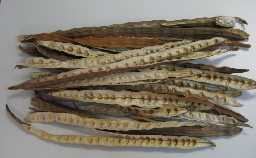
Biography
Biography: Miguel Godino Garcia
Abstract
Moringa (Moringa oleifera) is a high-productivity, fast-growing multipurpose plant adapted to dry tropical conditions. In Europe it is susceptible to grow in temperate Mediterranean areas with few frosts. As biomass, the composition of its nutrients makes it very interesting for its consumption, in green or dry, by both animals and people. Its fruits are triangular pods that provide oilseeds, with more than 30% of edible oil in its composition. Moringa pod husk are considered as a waste that, being rich in cellulose, is a source of raw material for the production of bioethanol. The management of the moringa tree crown, necessary for a good and easy harvest, provides a little lignified wood susceptible of being transformed in this biofuel. The massive production of moringa oil in tropical areas can represent an opportunity to value these residues and, with them, help combat the so-called Climatic Change together with the change of land uses and the reforestation of lands currently dedicated to extensive livestock. To explore the feasibility of using these residues for biofuels production, it´s necessary to know: the potential production of the residues obtained in a crop of moringa oil , the results of compositional analysis of stems and pods of moringa and the results obtained in the production of bioalcohol.

Recent Publications:
1. Ali, E. N., & MZ, J. (2015). Possibility of Producing Ethanol from Moringa Oleifera Pod Husk. Journal of Advanced Research Design, 5(1), 1-9.
2. Ali, Eman N. and Umarul, I. A. (2015) Possibility of Producing bioethanol from Moringa oleifera Press Cake. In: Proceedings of The Energy & Materials Research Conference (EMR2015): "Materials and Technologies for Energy Efficiency", 25-27 February 2015 , Madrid, Spain. pp. 22-25.
3. AZIZ, N. M. S. B. A. (2013). Investigating the potential of using Moringa oleifera husks for bioethanol production (Doctoral dissertation, Universiti Malaysia Pahang).
4. Godino García, M.; Izquierdo Osado, M. I. y Arias Sabín, C. (2014). Zonificación bioclimática de la moringa (Moringa oleífera Lam.) en la Península Ibérica para producir biocombustibles. In: Prodeedings of International Congress on Water, Waste and Energy Management Porto July 2014, 16/07/2014 - 18/07/2014, Porto (Portugal). ISBN 978-989-95089-6-5. p. 245
5. Godino García, M.; Izquierdo Osado, M. I. y Villegas, S. (2017). Evaluación del uso energético de la madera de Moringa oleifera. Presented in: 7º Congreso Forestal Español. Gestión del monte Servicios Ambienbtales y Bioeconomía. Plasencia, Cáceres, España. 26/07/2017-30/07/2017, Plasencia (Spain).
6. Martínez Salcedo, P., González, F., Suárez, C.A.,. Escobar, M. (2014). Adaptación y producción de biomasa de moringa (Moringa oleifera Lam.) en tres localidades del Departamento de Santander. Ponencia 6º Simposio Nacional Forestal. Colombia Forestal Vol. 17 (Supl. 1) / Octubre 9-10, 2014
7. Montaño Morales, Héctor Fabio (2014) Producción de bioetanol a partir de material lignocelulósico de moringa oleífera. Maestría thesis, Universidad Nacional de Colombia. http://dx.doi.org/10.1080/15435075.2017.1313738

